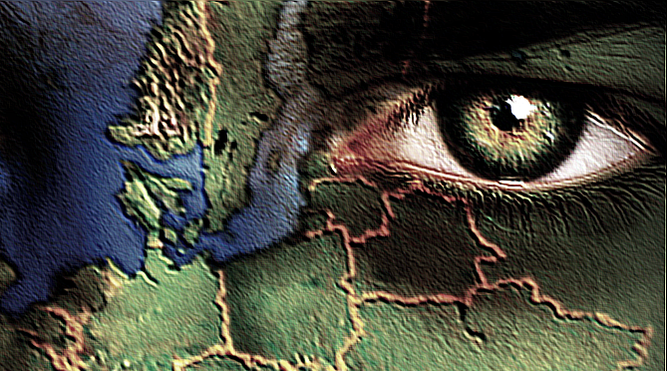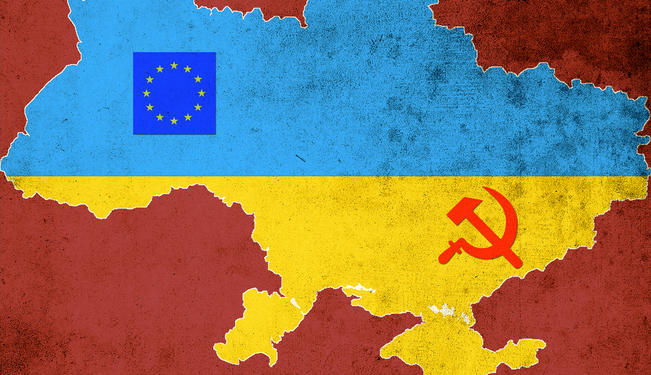The Conception of Patriotism in Chinua Acheb’s Novel Things Fall A Part

Prepared by the researcher
Khawla Kamel Abdullah Al-Kurdy/ Hashemite University – Jordan
Haifaa Kamel Abdullah Al-Kurdy The University of Jordan
Source – Democratic Arab Center
Journal of cultural linguistic and artistic studies : Issue XIII – May 2020
A Periodical International Journal published by the “Democratic Arab Center” Germany – Berlin
Journal of cultural linguistic and artistic studies
:To download the pdf version of the research papers, please visit the following link
Abstract:
African faces main problems in his life, he should obey to the tribe’s rituals and conventions, in the same time he shouldn’t care about the colonizer, who comes to colonize his country and make him as a slave. The struggle is highly increasing inside him between tribe’s conventions and his patriotism towards his land. This study tends to focuses on how African man (Okonkwo) presents this condition.
The problem of the study
The study focuses in two main questions:
1-How Okonkwo as (tribal man) who is Achebe’s hero treats his wives?
2-What is the role of Achebe’s main character in resisting the coming of white man (colonizer)?
The approach of the study
The researchers used the inductive approach, as the suitable approach of the study.
Introduction
The introduction shows Chinua Achebe’s view of the conception of patriotism, and focuses on two points, first point: Chinua Achebe’s biography, second point: different studies of the patriotism’s conception in Chinua Achebe’s novel Things Fall A Part, also it presents quick glance of different views of patriotism conceptions.
The study’s purpose is to shed light on the conflict inside African man (Okonkwo) between tribe’s conventions and his duty towards his country.
First: Chinua Achebe’s biography
Chinua Achebe born in 1930, was brought up in Christian evangelical family in the large village of Ogidi, one of the first centers of Anglican missionary work in Igboland, Eastern Nigeria. After studying medicine and literature at University of Ibadan, he went to work for the Nigerian broadcasting company in Lagos. His career in radio ended abruptly in 1966 when he left his position as director of external broadcasting Logos, during the national upheaval and massacres that led to the Biafran war. He had narrowly escaped confrontation with armed soldiers who apparently believed that his novel, a man of people, implicated him in Nigeria’s first military coup (Heinemann Ltd,1986).(1)
Achebe’s career as a University academic began in 1967 with his appointment as senior research fellow at the University of Nigeria. He was made Emeritus professor in1985. Other Universities he taught at include the University of Massachusetts and the University of Connecticut. Achebe has received numerous honors from different parts of the world, including over twenty honorary doctorates from Universities in Britain, the USA, Canada and Nigeria. In 1987 he received Nigeria’s highest award for intellectual achievement, the Nigerian National Merit Award. Achebe is the author of many novels, short stories, essays and children’s books (Heinemann Ltd,1986).(2)
Here we notice that Chinua Achebe presents big efforts, in order to gain what he wants, he loves his work as a writer alongside as a teacher in different famous Universities, his actions were esteemed, therefor, he gets many awards in writing field. He believes in writing as a method, to reach his readers. Teaching in worldly Universities led him to be well-known, able him to send his moral and logical messages to the most of the Africans men, to recognize that believing in tribal conventions, push them to the misery endings. His thoughts encourage young men to save themselves from primitive deeds, which reflect negatively on their lives and societies.
Second: literature view of patriotism’s conception in Chinua Achebe’s novel Things Fall Apart.
In this point we list six studies, which concentrate on how Chinua Achebe’s presents his view of patriotism, those studies give different explanation of patriotism.
1- Exploring patriotism in Chinua Achebe’s Things Fall Apart. (Jamir,2018).(3)
This study tends to shed light, on Achebe’s Things Fall Apart(1958)(4) portrays the issues of patriotism and reflects the political and social conditions of Nigeria. The novelist reveals the period of Nigeria, when colonialism and Christianity was in direct attack. The novel is set during the late 1800s or beginning of the 1900s in a small village called Umofia situated in the south-eastern part of Nigeria. The time period indicated in the novel is important, because it was a period in colonial history when British were expanding their influence in Africa, right before the arrival of white man economically, culturally and politically. Umofia is an Igbo village with very well-defined traditions. This well-defined traditional Igbo village is torn apart by the coming of the white man. The whole novel centers round Umofia where Achebe presents different aspect of patriotism and nationhood like good patriotism, “bad patriotism”. pitfalls of nation consciousness many other things.
2- Chinua Achebe and the Nigerian predicament: A tribute to a patriot (Obo,2014):(5)
This essay aims at celebrating the life of Achebe who is widely acclaimed as a literary giant. While acknowledging the fact that like all human beings, Achebe was not perfect, it is contended that he was a great patriot, a globally venerated writer, and an indefatigable critic of bad governance and the domination of man by man.
3- Dissent as a higher form of patriotism (Vakunta,2013):(6)
Vakunta’s essay points that Chinua Achebe contends that one common feature of underdeveloped nations is the tendency among the ruling elite to live in a world of make-believe with regard to matters pertaining to patriotism . He remains adamant that ‘spurious patriotism’ is one of the hallmarks of Nigeria’s privileged classes whose generally unearned positions of sudden power and wealth must seem unreal even to themselves. Achebe’s definition of a true ‘patriot’ is one who will always demand the highest standards of his country and accept nothing but the best from his people. He will be outspoken in condemnation of the shortcomings without giving way to superiority, despair of cycricism.
4- The trouble with Nigeria: Chinua Achebe on patriotism (Mbeki,2012)(7):
The essay is targeted to show that, in spite of the tendency of people in power to speak about the great nation of ours, there is no doubt that Nigerians are among the world’s most unpatriotic people. But this is not because Nigerians are particularly evil or wicked, in fact they are not. It is rather because patriotism, being part of an unwritten social contract between a citizen and the state, cannot exist where the state reneges on the agreement. The state undertakes to organize society in such a way that the citizen can enjoy peace and justice, and the citizen in return agrees to perform his patriotic duties.
5-Who is a patriot and who is a hero? (Acemah,2012):(8)
This article points that according to Nigerian author, Chinua Achebe in a book titled, the trouble with Nigeria, “patriot is not a person who says he loves his country, he is one who cares deeply about the happiness and well-being of his country and its people.
6- Are we Really All Patriot? (Ochonu,1983)(9):
The article aimed is to answer the one central question who is a patriot? Answers to this question have understandably conformed to the two main schools of Nigerian commentary: those uncritically supportive of the status quo and those uncompromisingly sworn to opposing it. At any rate, how possible is patriotism in a country, as troubled as Nigeria? After all, one’s patriotic favor increases in tandem with the ability of willingness of one’s country to improve the quality of one’s life through the provision of social infrastructure, access and opportunity. Emptied of these tangible associations, of what use is patriotism? patriotism cannot be its own justification. It is usually inspired by something more concrete.
Now, we notice that the previous studies, have different analysis and expressions. The researchers attention gets behind the fifth study, which presents crucial explanation of patriotism, alongside Achebe’s view, although the sixth one gives it’s own explanation of patriotism, keeps the door open to reader, of who is the patriot? on the other hand, the third study really shows the real reason, of why the Nigerian people don’t have ability to defend their country, because their country didn’t play it’s fundamental role towards them, until to do their duties as a good citizens.
Third: different views of patriotism
The researchers will present ten of different views of patriotism, all writers agree with nearly one view, except two views Tolstoy and Kateb, both have unusual identification of patriotism.
- Patriotism can be defined as love of one’s country, identification with it, and special concerns for its well-being and that of compatriots (Plato standard ford .edu)(10):
- Patriotism: is the awareness of our moral duties to the political community (Acton,1972)(11):
- Patriotism: it is a devotion to particular place and a way of life one thing best, but has no wish to impose on others (Orwell,1968)(12).
- Russian novelist and thinker Leo Tolstoy found patriotism both stupid and immoral (Plato Stand ford. edu)(13). It is stupid because every patriot holds his own country to be the best of all whereas, obviously, only one country can qualify. It is immoral because it enjoins us to promote our country’s interests at the expense of all other countries and by any means, including war and is thus at odds with the most basic rule morality, which tells us not to do to others what we would not want them to do to us (Tolstoy,1987)(14).
- Recently, Tolstoy critique has been seconded by American political theorist George Kateb, who argues that patriotism is “a mistake twice over: it is typically a grave moral error and its source is typically a state of mental confusion” (Kateb,2000)(15).
- Patriotism or national pride: is the feeling of love, devotion and sense of attachment to a homeland and alliance with other citizens, who share the same sentiment. This attachment can be a combination of many different feelings relating to one’s own homeland, including ethic, cultural, political or historical aspects(en.m.wikipedia.org)(16).
- Patriotism: is the state of mind developed by the love of country and based on the beliefs of our founding fathers. It’s the immense pride you feel for a country that allows you the freedom to developed your skills no matter your station in life (Products.kitapsun.com)(17).
- Patriotism: is as patriots have done, in which patriotism is rooted in the love of one’s own land and people, love too of the best ideals of one’s own culture and tradition. It is profoundly municipal, even domestic. Its pleasure is quiet, its services steady and unpretentious (thenation.com)(18).
- The ancient Roman Tacitus defined patriotism as: entering praiseworthy competition with our ancestors (thenation.com)(19).
- Real patriotism: comes from the heart and is always voluntary. Its feeling of loyalty and that comes with certain conditions. Those conditions being that nation is serving. Those all of our interests-and that isn’t the case dissent is so very patriotic (hughes,2016)(20).
According to researchers, the patriotism is presented by one’s attitudes towards his country Who do not care whether he lives or not, he insists on defending his country, if any enemy tries to occupy it, he is ready to give his soul, to liberate his land, people, and properties? Patriotic is the one who form his action as resistance or defensive or save, whatever he dies or getting jail and facing torturing. Most of patriotic owns respected moral, conducts and talks. On the other side, Tolstoy gave shocked identification of patriotism, he argues that patriot is without morality, looking for his benefits and interests, careless of country and people, in his ambiguous view of patriotism, he broke the mainstream of patriotism for most of human societies, in the same way, Kateb agreed with Tolstoy’s view of patriotism. It seems they tend to shed light on the hidden side of patriotism, in which most of writers, wanted to give familiar view of patriotism.
First question: how Okonkwo (tribal man) as Achebe’s hero treats his wives?
We notice that the main character Okonkwo and his way treating his wives reflects the lives of Africans at the era. Okonkwo married three women, in which he treats his wives in very strict way. Okonkwo is an example of African man, who gives orders to his wives and they should obey.
In African society women are subservient and often reluctantly obedient. Okonkwo repeatedly issues orders, and his wives carry them out, in which Women in African community should listen to their husbands because they live in a patriarchal society without any rights. They are blind and oppressed. In addition, African women live in their clan like attendants.
However, African women are disadvantaged in their community, They are neglected and their rights are completely denied, they are only having duties. For example: when Okonkwo’s young wife neglects her domestic duties, Okonkwo beats her without pity. In contrast, man should beg his wife if she is angry.
Africans see their families as holy thing if man is unable to rule his women and his children, he is not considered as a real a man. So, Okonkwo as African encourages his boys to sit with, and told them stories of the land, masculine stories of violence and bloodshed.
We notice here how Africans try to exclude women from society, they see women as a stupid and mindless creature. African man wants to marginalize women and lower her feeling and idea. In general, woman’s work in tribe depends on domestic duties as: cooking food and pleased her husband, she lives extremely in a patriarchal society.
However, most of clan’s traditions humiliate and insulted women, one of this ceremony “if a wife had been separated from her husband for some time and were then to be re-united with, this ceremony would be held to ascertain that she had not been unfaithful to him during the time of their separation” (Heinemann Ltd,1986)(21). This ceremony is abusive, because women in their tribe seem untrusted person. Men through this ceremony wants to test their wives in order to know if they are faithful or not, women in clan’s view is a suspicious creature, but man is above suspicions. Actually this kind of tradition lowers women and puts them under horrible pressure. We see that most of tribe’s conventions were described in term of discrimination.
Okonkwo has psychological troubles because of his contradictions. because his father as flute player derives ignominy for Okonkwo, since Okonkwo represents masculine-male, but Unoka whose lazy and improvident represents feminine-female.
Second question: what is the role of Achebe’s main character in resisting the coming of white man (colonizer)?
In Things Fall Apart we notice how the arrival of white man causes war, and troubles for clan. Achebe sees that African should abandon clan’s traditions and rituals, which weakness them. African should listen to their mind and they should gain dignity and self-respect by dropping any bad traditions, which get them like monsters and primitives in world’s view.
Things Fall Apart shows how African’s way of thinking and their harsh treatment of individuals, which get them left their heroes, who derives honor to their clan. In contrast, oppression, aggression and savage inside clan, reflects on African life and their community, which allow the white man occupied their country.
Things Fall Apart as post-colonial literary work is about western who make judgement on everything according to their view. Also, the westerns regards himself as helper for others, Okonkwo feels that the white man threats his clan’s traditions and existence of all tribe, but Okonkwo paid high cost, because he challenged the arrival of whites lonely and finally Okonkwo became a victim of clan’s traditions.
Things Fall Apart seems clear response to the colonialist criticism, in which the arrival of the Christian missionaries attracts and support outcast clan members to undermine traditional moral. Thus, Okonkwo cannot be silent, and resists thus, he commits a suicide with a shame and defeat.
The feeling of confusion and lack, push Okonkwo to choose a way of risks and danger, he even sacrifices with Ikemefuna who like his son, in order to please his pagan religion, Okonkwo who represents the perspective of colonized, rejects to be in the inferior position, and refuses to see colonizer in superiority position and dominates Okonkwo’s clan and people.
The study’s findings can be listed in main points:
1-African people should get red from their dogmas, which put additional burden on the generation’s back.
2-Men and women in Africa have rights to be treated, not like machine according to the tribe’s conventions.
3-There are different views of patriotism, and most views agree that true patriot, who defends his country in front of any colonizer.
In contrast, after Okonkwo’s scarification and loyalty for his tribe’s tradition, he is buried like a dog since his people consider him as stranger, and left him alone to face his dark destiny with pain and sorrow.
Conclusion
the researchers listed six studies, debating the Achebe’s view of patriotism, ordered them from the newest to the oldest one, all studies give readers some lights on patriotism and how Achebe reforming his main character in responding the coming of colonizer, whereas the clan left him alone facing tragedy ending, this responding is the core of patriotism. Noticing that there are different views about patriotism, each writer has his own explanation of patriotism, may refer to their (society-ideology-experience-discourse…..etc. Trying to reveal the conception of patriotism, Achebe sees that clan’s rituals distorted everything even values and principles of Nigerians people, he refuses the clan’s inclination, because it makes such pressure on the one’s aim towards his/her patriotism.
Achebe shows real view of patriotism, which is presented by the hero Okonkwo, and beneath it Achebe criticizes the convention of clan that dominates individuals for primitive traditions that are dangerous to African people.
Chinua Achebe believes that patriotism, doesn’t need to be as a matter of controversial, true patriot defends his land, without any permission from his tribe. For Achebe man without land, he will lose his country’s glory and history.
Woman is denied person in tribe’s convention, obedience and serving to husband and sons, until husband as man has completed right to control her, treat her as getting birth machine, cooking, and do all domestic duties, subservient to her husband without any word, even if he hits them.
Achebe explains that it’s time for African’s generations to protest and high their voices, to put an end in front of tribe’s domination of its individuals. They should confront any action or word may hurt them.
Achebe sees many challenging facing African people. the crucial point is the coming of white man (new colonizer) who inclines to colonize African’s land, they must leave tribe’s old conventions which make them be like slave not as human being. To have feelings and mind, in order to kick out the colonizer. Achebe thinks that clan’s un humanities conventions are the main obstacle towards liberating Africans from western controlling.
Achebe’s belief depends on that every African person should co-operate with each other, to stop any new confrontation, he gives an important message to the youths, they have to put tribe’s un logic conventions behind their back and go on. And if they are one hand, they can save their countries in front of any kind of threating.
References
1- Heinemann,William : First published Heinemann, Educational Publishers, 1986.
2-previous reference
3- Jamir,Rosaline : Exploring Patriotism in Chenua Achebe’s Things Fall A Part, National institute of technology Nagaland. Chumukedima Dimapur-Nagaland, 2018.
4- Achebe,Chinua :Things Fall A Part, illustrated by Uche Obkeke, 1958.
5- Obo,Vgumanim : Chinua Achebe and the Nigerian Predicamen: Atribute to a Patriot.Global Journal of interdisciptinary social sciences. University of Calabar,Calabar,2014.
6- Vakunta,Peter : Dissent as a higher form of Patriotism,2013.
7- Mbeki,Thabo : Chinua Achebe on Patriotism,2012.
8- Acemah,Harold : Who is a patriot and who is a hero?, 2012.
9-Ochonu,Moses : Are we really All Patriot,1983.
10-plato.standford.edu Retrieved 17/8/2019
11- Acton,Lord :”Nationality” essays on freedom and power,Gloucester: Peter Smith, 1972, p141-70.
12- Orwell,George : “Notes on Nationalism”, Collected Essays Journalism and Letters, Sonia Orwell and Ian Anues(eds), London: secker & warburg,1968, vol 3, p361-80.
13-previous reference
14- Tolstoy,Leo : on patriotis and patriotism, or peace? “Writings on Civil Disobdience and nonviolence, Pheladelphia. New society Publishers,1987, p 51-123, p 137-47.
15- Kateb,George :“Is Patriotism a Mistake?”, social research, 2000, p 67.901-24, Reprinted in Kateb. Patriotism and other Mistakes, Ithaca: Yale University Press,2006.
16-en.m.wikipedia.org Retrieved 16/8/2019
17-products.kitapsun.com Retrieved 18/8/2019
18-thentan.com Retrieved 14/8/2019
19-previous reference.
20- Huges,Micheal :”What is Real Patriotism Anyway”, 2016 Retrieved 16/8/2019
Huffpost.com
21-previous reference.




